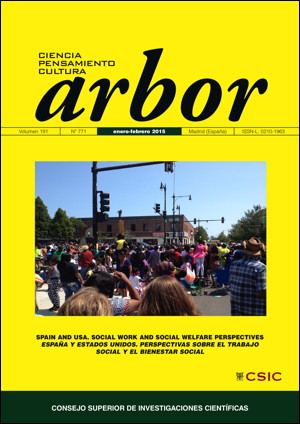¿Qué puede aportar el trabajo social en el siglo XXI? Perspectivas desde USA y España
DOI:
https://doi.org/10.3989/arbor.2015.771n1001Palabras clave:
Trabajo Social, servicios sociales, políticas socialesResumen
En este artículo, analizamos los principales retos que afrontan nuestras sociedades, y el papel que puede jugar el Trabajo Social como disciplina científica y como profesión de ayuda, prestando especial atención a la situación de España y de los Estados Unidos de América.
Descargas
Citas
Del Fresno García, M. (2011). Retos para la intervención social con familias en el siglo XXI. Consumo, ocio, cultura, tecnología e hijos. Madrid: Trotta.
Del Fresno García, M. and López Peláez, A. (2014). Social Work and netnography: the case of Spain and generic drugs. Qualitative Social Work: Research and Practice, 13, 1, pp. 85-107. http://dx.doi.org/10.1177/1473325013507736
Della Porta, D. (2013). Neoliberalismo amoral y protestas morales: movimientos sociales en tiempos de crisis. Servicios Sociales y Política Social. Social Services and Social Policy, XXX, 103, pp. 21-38.
Dominelli, L. and Hackett, S. (2012).Social Work Responses to the Challenges for Practice in the 21st Century. International Social Work, 55, 4, pp. 449-553. http://dx.doi.org/10.1177/0020872812440784
Dulmus, C. N. and Sowers, K. M. (2012). Social Work Fields of Practice: Historical Trends, Professional Issues and Future Opportunities. New York: Wiley.
Etzioni, A. (2004). Foreword. In Gilbert, N. Transformation of the Welfare State. The silent surrender of public responsibility. New York: Oxford University Press, pp. XIII-XVI.
Featherstone, B. (2011). The current economic crisis in Ireland: Why social work needs to be part of the challenge to a discredited system? Comunitania. International Journal of Social Work and Social Sciences, 1, pp. 17-29. http://dx.doi.org/10.5944/comunitania.1.1
Gilbert, N. (2004). Transformation of the Welfare State. The silent surrender of public responsibility. New York: Oxford University Press.
Gilbert, N. (2008). A Mother´s Work. How Feminism, the Market, and Policy Shape Family Life. New Haven: Yale University Press.
Gilbert, N. (2014). Citizenship in the Enabling State: the Changing Balance of Rights and Obligations. In Evers, A. and Guillemard, A-M. (eds.) Social Policy and Citizenship. New York: Oxford University Press.
Gorjón, F. and López Peláez, A. (coords.) (2013). Estado del arte de la mediación. Pamplona: Aranzadi.
Jones, D. N. and Truell, R. (2012). The Global Agenda for Social Work and Social Development: A place to link together and be effective in a globalized world. International Social Work, 55, 4, pp. 454-472. http://dx.doi.org/10.1177/0020872812440587
López Peláez, A. (ed.) (2014). The Robotics Divide. A New Frontier in the 21st Century? London: Springer. http://dx.doi.org/10.1007/978-1-4471-5358-0
Miranda Martín, M. (2012). Contexto de la actividad y pensamiento de Mary Richmond. Cuadernos de Trabajo Social, 4, pp. 35-45.
Moreno Mínguez, A., López Peláez, A. and Segado Sánchez-Cabezudo, S. (2012). The Transition to Adulthood in Spain. Economic crisis and late emancipation. Barcelona: Obra Social la Caixa.
Ortega y Gasset, J. (1930/1984). La rebelión de las masas. En Obras Completas (vol. 4).Madrid: Alianza Editorial, pp. 113-312.
Reardon, C. (2011). 10 Trends That Transformed Social Work. Social Work Today, July/August 2011, pp. 10-15.
Richmond, M. (1917/2005). Diagnóstico social. Madrid: Siglo XXI.
Scharlach, A. E. and Hoshimo, K. (2013). Healthy Aging in Sociocultural Context. New York: Routledge.
Segado Sánchez-Cabezudo, S. and López Peláez, A. (2014). Social work with middle-class Spanish families: The challenge of the work–family conflict. International Journal of Social Welfare, 23, pp. 100-111. http://dx.doi.org/10.1111/ijsw.12012
Sen, A. (2010). La idea de justicia. Madrid: Taurus.
Sennett, R. (2012). Juntos. Rituales, placeres y política de cooperación. Barcelona: Anagrama.
Publicado
Cómo citar
Número
Sección
Licencia
Derechos de autor 2015 Consejo Superior de Investigaciones Científicas (CSIC)

Esta obra está bajo una licencia internacional Creative Commons Atribución 4.0.
© CSIC. Los originales publicados en las ediciones impresa y electrónica de esta Revista son propiedad del Consejo Superior de Investigaciones Científicas, siendo necesario citar la procedencia en cualquier reproducción parcial o total.
Salvo indicación contraria, todos los contenidos de la edición electrónica se distribuyen bajo una licencia de uso y distribución “Creative Commons Reconocimiento 4.0 Internacional ” (CC BY 4.0). Consulte la versión informativa y el texto legal de la licencia. Esta circunstancia ha de hacerse constar expresamente de esta forma cuando sea necesario.
No se autoriza el depósito en repositorios, páginas web personales o similares de cualquier otra versión distinta a la publicada por el editor.














